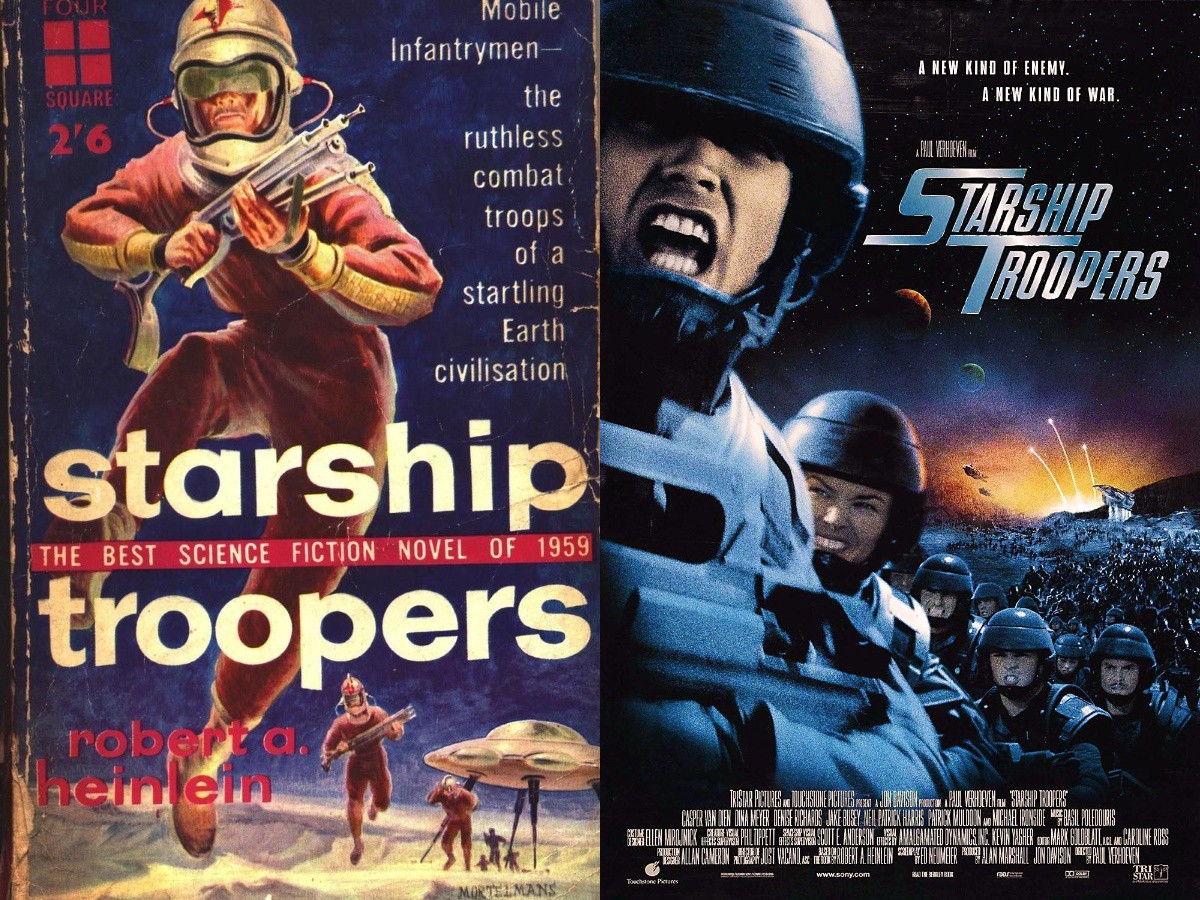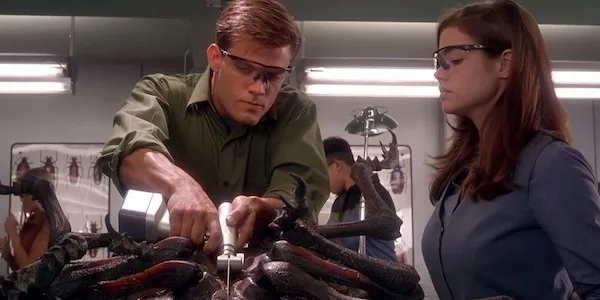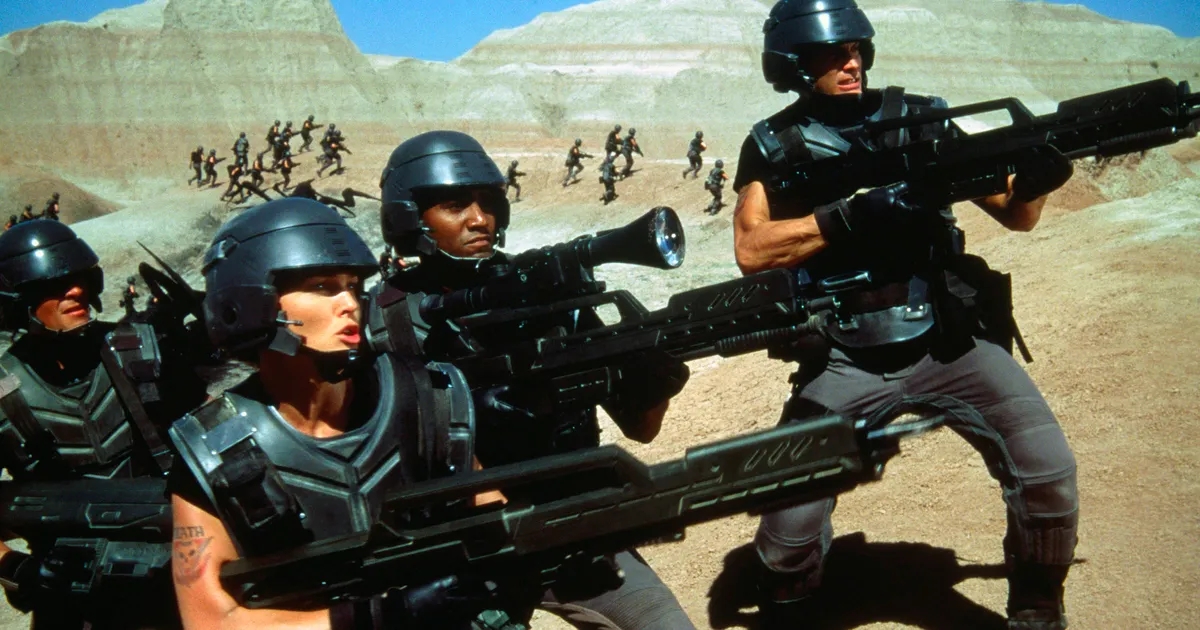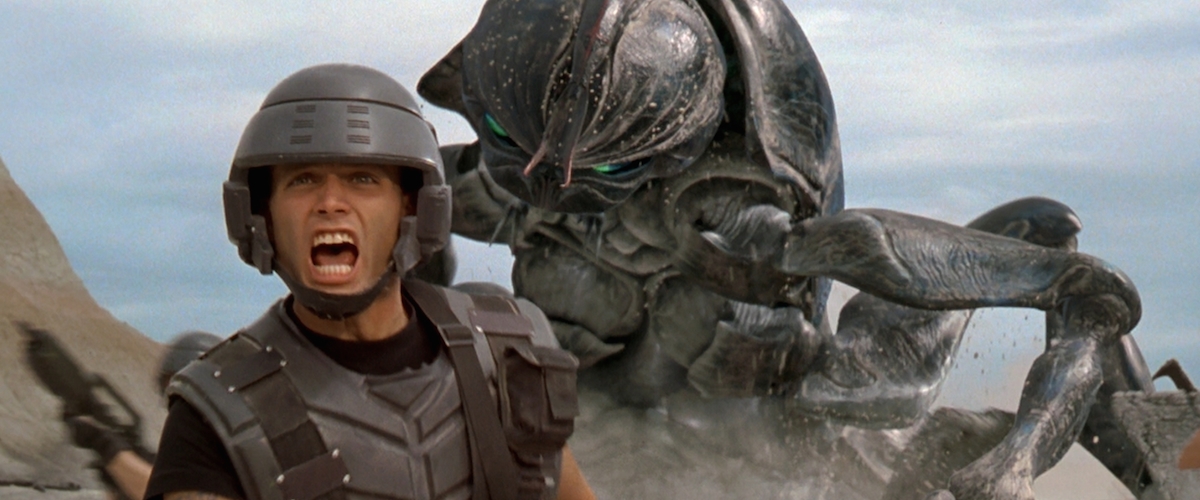I say this with zero sense of irony or hyperbole: Starship Troopers is a masterpiece of cinema, unlike anything that has ever been put to film.
Right now you might be thinking “Really? The movie where Earth sends a space military to kill a bunch of giant bugs? Isn’t that just a dumb action movie?” If so, you wouldn’t be alone. At the time of its release in November of 1997, audiences and critics alike immediately dismissed the film as just that; a poorly acted, over-the-top, mindless gore-fest. But don’t just take my word for it; here are some of the scathing reviews that Starship Troopers received when it was released…
“Cheerfully lobotomized” – LA Times.
“Exactly like Star Wars – if you subtract a good story, sympathetic characters, intelligence, wit and moral purpose” – Washington Post.
“crazed, lurid spectacle”… “raunchiness tailor-made for teen-age boys.”- Janet Maslin, The New York Times
“a nonstop splatter-fest so devoid of taste and logic that it makes even the most brainless summer blockbuster look intelligent.”-Jeff Vice, the Deseret News
“one-dimensional,” a trivial nothing “pitched at 11-year-old science-fiction fans.” -Roger Ebert.
While I hate to admit it, I heaped my own similar criticisms at the film when it first came out. I was about twelve years old when I first saw Starship Troopers (which, in retrospect, was way too young). My dad had rented it from our local video store and, like most audiences, we were expecting a fun, sci/fi action romp; a Star Wars for this generation. I remember my excitement for it; the movie I had in my head that the previews had promised. I was fully prepared for a serious movie about tough, cool, space soldiers; the grunts fighting on the front lines of a futuristic war against hordes of giant alien bugs. I imagined it was going to be like James Cameron’s hit sequel Aliens, but with the space marines as the focus of the whole movie. When you get a sense of those expectations, it may be easy to understand why watching Starship Troopers for the first time was bound to be a confusing and disappointing experience.
From the very opening of the film, my adolescent expectations of the movie I wanted were instantly disrupted. The movie didn’t begin with some cool action sequence, showing off how awesome this futuristic military was; nor did it begin with some scary attack from the alien monsters to set up the horror of the film. Instead, the movie opens with a futuristic military advertisement for the “mobile infantry”. The commercial speaks directly to the viewer through a booming, cartoonishly heroic voice accompanied by the corniest patriotic anthem ever composed. The narrator tells the audience to “Join Up Now” and register for the Federation’s mobile elite. The commercial’s imagery is comprised of bright, cheery visuals of happy soldiers smiling directly at the camera, proudly stating “I’m doing my part!” We see kids in a park interacting with the friendly soldiers, who allow the excited children to hold their guns as they teach them how to aim. We see a group of school children cheerfully stomping on cockroaches while their teacher gleefully applauds them. The commercial shows us that even this little bit of bug-stomping helps, as the voice and text exclaim “They’re Doing Their Part! Are You?”

The film had not even reached the 5-minute mark and the circuitry in my pre-teen brain was frying. What was I looking at? Why did this movie look like a cheap, after-school special or like an episode of 90210? Why was the tone so bright and campy? As the movie went on, I found myself increasingly confounded at what I was seeing on screen. The performances ranged from incredibly campy to incredibly wooden and the violence went so far with its gore that it was both extremely upsetting and laughably over-the-top. By the time the movie was finished I remember my dad and I agreeing that it had to be one of the worst movies we had ever seen. So I closed the book on Starship Troopers, concluding that it was one of the worst and most mind-boggling approaches to a movie I had ever witnessed.
Even at that time, one thing I couldn’t deny was that it was memorable; if only in the way of never forgetting which restaurant gave you food poisoning. It left a strange impact on me in a way that I could not comprehend at that time. I knew that there was something upsetting about it. The visuals painted such a sunny, sit-com level atmosphere violently juxtaposed by some of the most disturbing images of gore that my eyes had ever seen. The result was a clash that my 12 year old brain did not have the room to accept or process. So, like many others at the time, I rejected it as a dumb war movie for jocks. It would not be until I was in college that I found myself coming back and giving the movie another chance.
A fellow movie-buff friend of mine told me that Starship Troopers was one of his favorite films of all time. At first, I assumed he was joking but the more we talked, the more it was clear that I needed a serious reassessment of this film. I had already been hearing rumblings about the movie slowly gaining status as a beloved cult film. My assumptions were that people must be appreciating the film on a level of “so bad that it is actually entertaining”, but my friend assured me this was not the case. It only took my first re-watch for the movie to unfold and finally make sense to me. I wasn’t watching a movie that was failing in an effort to be a populist action film; I was watching a movie succeed as a scathing satire; a critique of fascism, and the American military industrial complex. I could see why it went over so many heads when it came out and why so many people did not understand what the film was doing. Starship Troopers is a rare film; one that is so committed to the overall narrative gimmick of its thesis, so unwilling to “break character” or give the audience a reassuring wink that it knows what it’s doing is silly, that it sacrifices people not getting the joke. While this move didn’t pay off in box office sales, it has certainly earned the film serious street cred among cine-files who champion its unwavering artistic integrity.
For those who have never seen the film, Starship Troopers is (VERY loosely) based on the Robert Heinlein novel of the same name, which was written in 1959. I say “very loosely” because, while the surface details of the plot are more or less the same, the tone and intent behind Heinlein’s book, is radically different from the film. The story of Starship Troopers (both the book and film) is set in the distant future; one where humans have mastered space travel and used it to begin colonizing other worlds outside of our galaxy. Along the way, humans came across “Klandathu”, a planet located on the opposite end of our galaxy, populated by giant, bug-like aliens. Even though these giant alien insects are extremely deadly, Earth has attempted to colonize the planet anyway, provoking the otherwise benign species to violently retaliate against them. Instead of respecting the arachnids’ home planet and cutting their losses, they present the bugs’ act of defense as an act of war and use their global government known only as “The Federation” to pump a steady stream of “anti-bug” propaganda into all forms of media. In doing so, the Federation enlists wave upon wave of young recruits into its interstellar war, all of them eager at the chance to slaughter this species completely out of existence. Primary among these young recruits is: Johnny Rico; a regular teenager from Buenos Aires who registers into the mobile infantry, against the wishes of his parents. The story follows Rico through the hardships of war, as he rises up through the ranks and becomes molded into a perfect soldier of the Federation.
Film historians may instantly notice the similarities between the plot structure of the movie and that of a notoriously well-known propaganda film called Triumph of the Will, which was made in 1935 as a recruitment tool for the Nazi party. This is no accident, but rather the whole lynch-pin of director Paul Verhoeven’s radical approach in adapting this pulp science fiction novel into a big-budget motion picture. Rather than making a straight forward adaptation of Heinlein’s story, Verhoeven, who regards the source material as “boring [and] really quite a bad book”, set out to turn Starship Trooper’s extremely jingoistic, pro-war novel on its head. While the book treats its message at face value as something cool and heroic, the film is fully aware that Heinlein’s story is a fascistic nightmare. The magic of the this choice is that, instead of attempting to “fix” these problematic elements of the book, it fully leans into them, giving the audience a full view of what Heinlein’s “perfect” facsist, authoritarian Earth would actually look like. The end result is a planet where humans have no democracy, citizenship is guaranteed only through military service, and for all the dazzling futuristic advancements they have made in technology and medicine, all it’s good for is killing bugs. The journey and eventual victory of these protagonists is therefore not meant as something for audiences to cheer, but rather, it is a cautionary tale of what America could become. Verhoeven states, “I decided to make a movie about fascists who aren’t aware of their fascism . . . this was about American politics. As a European it seemed to me that certain aspects of US society could become fascistic: the refusal to limit the amount of arms; the number of executions in Texas [etc.] . . .” (Verhoeven, as cited in How we made starship troopers, 2018). Make no mistake, the “heroes” of Paul Verhoeven’s Starship Troopers are Nazis, through and through. In one of the film’s final and most chilling moments, a commanding psychic officer stands before the “Brain Bug”, the giant slug-like monarch of the arachnid species, which has been captured and dragged out of its cave by the mobile infantry. It lays there surrounded by legions of armed Federation soldiers, trembling while this psychic officer (played brilliantly by Neil Patrick Harris) reads its mind. After a moment of silence, Harris’s psychic officer turns to the hordes of infantry men and women and proudly exclaims “IT”S AFRAID!!!!” which is met with exuberance, laughter, and practically euphoric elation from our heroes. If the film’s message had been lost on you before, this moment should make it clear: these people derive joy from witnessing the fear and suffering of their enemies.
Viewing the film now, its almost mind-boggling to know that this message seemed to sail past most American audiences, especially considering the blatant visual cues the film gives us. Take a look at Neil Patrick Harris’ character below, whose uniform is clearly a direct inspiration of the Nazi uniforms worn by the S.S.

“I borrowed from the films of Leni Riefenstahl to show that these soldiers were like something out of Nazi propaganda. I even put one in an SS uniform. But no one noticed” (Verhoeven, as cited in How we made starship troopers, 2018)
Verhoeven is a fascinating artist who brings with him an extremely unique perspective to aspects of American culture. Primarily, Verhoeven is continually drawn to our relationship with authoritarians, media consumption, patriotism, violence and fascism as can be seen in his previous films such as Robocop and Total Recall. His continued interest in exploring these themes and subjects has a large part to do with his childhood. Verhoeven is Dutch, and was born and raised under Nazi occupation of the Netherlands in the 1940s. His formative years were shaped by the most horrific display of fascism the world had ever seen and it has served to inform much of the art that he makes. In particular, much of his pitch black satirical sense of humor, his cavalier attitude towards violent imagery, and his penchant for maximalism likely all stem from being born into a place that is under Nazi rule. In this sense, I believe that Starship Troopers is oddly the most personal of Paul Verhoeven’s films. It serves to be the culmination of many of his points of interest as well as being the most direct statement against fascists in his body of work to date.
Starship Troopers is a film constructed to be two things at once. On one level the film exists as a satirical statement on the worst aspects of American patriotism and the dangers of succumbing to a militaristic rule. At the same time the movie has to exist and succeed as the very thing which it is satirizing: a big, loud, patriotic action movie. It was by design that the film would be advertised in this way; to convince American audiences (such as myself), that this was going to be a movie about our military kicking butt all over the galaxy. This appeal to our nationalistic tendencies and hunger for mindless action was, more or less, a Trojan Horse for Verhoeven to sneak in the real movie that he wanted audiences to see. That “real movie” which he successfully made is perfectly framed within the opening and closing device of the futuristic propaganda film. Verhoeven makes it clear that the entire film the audience is watching is all a part of this military recruitment advertisement. Johnny Rico and his friends, whether they are supposed to be film actors in a fictionalized recruitment ad or real people whose story is being filmed documentary style, are nevertheless all propaganda devices. By the end, we are reminded that our protagonist’s journey is structured with one goal in mind: to get you to join up into the ranks of the mobile elite. The film’s closing montage practically presents itself like that of a commercial for a series of action figures or a new video game, where you, yes-YOU, could be a hero just like the brave men and women of the Federation’s mobile elite! Are you a grunt infantry man like the heroic leader Johnny Rico? Maybe you want to be the wild man of the bunch like Johnny’s best friend Ace! Or are you the cerebral type? If so, you can be just like Carl, the Federation’s Psychic officer in the Games and Theory division. Regardless of what you are good at, the Federation will easily find a place for you. Verhoeven deftly handles these commercial sequences with the understanding of exactly how propaganda works. After all, he saw it happening first hand when he was a child.
In Verhoeven’s hands, the propaganda of this film is engineered in the same way real propaganda films work; by simplifying everything down to its basest level of black and white, good versus evil. It is articulated to prey upon our lethargy, our need for a simple, easy answer or a target to point our frustrations toward. Everything on Earth in this movie is presented as a very clean, futuristic, utopian society, down to the fact that all of our young protagonists look like living Barbie and Ken dolls. This is not an exaggeration, but rather a purposeful choice Verhoeven makes to support his overall thesis. It is also possibly his most divisive and extreme choice at that, but one which I truly believe serves to add to the film. While most movies are cast with attractive movie stars, Verhoeven’s casting process of this film was one which purposely sought out Hollywood’s most conventionally pretty actors/models, most of whom had limited acting experience. It is a choice that has its roots in the history of propaganda films as well as the visual shorthand from our oldest forms of storytelling, where all the heroes are good-looking and the villainous characters are hideous.
Most of the cast had previously acted on day time soap operas or prime-time teen romances like Beverly Hills 90210, such as two of its leads: Casper Van Dien and Denise Richards. Verhoeven chose this film’s crop of actors with the main vision that he needed actors who would have the look of people chosen for a propaganda film, and as is the case with most propaganda films, the looks would come first and would be the most important aspect. This tradition among propaganda films would typically lead to very wooden, stilted performances. Verhoeven knew that, while a potentially self-sabotaging choice for his own movie, it was an important ingredient for recreating the aesthetic of the propaganda film. His choice in casting went so far as to not even telling his actors they were making a satire because he needed his characters to believe in everything they were doing. These characters were not savvy to anything other than the world-view they had long been indoctrinated into. The end result of this choice lead to an ensemble of very limited actors, very much out of their depth, giving very campy performances, but this too is a critical component for the constructed reality of Verhoeven’s movie. He was recreating the aesthetic of these films and he recognized the performances as an extension of that aesthetic. While these choices would prove to be quite damning to the film’s immediate success in 1997, they would eventually help to preserve the film as one of the most uncompromising and bold approaches to a mainstream blockbuster film. It is very much worth noting that, since its release, Starship Troopers has had one of the greatest critical turnarounds in film history, with film fans from all over discovering it as a movie that was way ahead of its time which people are just now finally catching up to. Don’t just take my word for it, look at some of these recent reviews by critics that completely re-evaluate the film as high art…
“One of the most merciless satires of its time, Paul Verhoeven’s gung-ho, bug-squashing Reich-fest confused critics and audiences when it hit theaters in 1997; from the gruesome effects and rousing battle scenes to the insidiously quotable script (“Would you like to know more?”) and darkly stirring score, it’s just too damn well-made for its own good.”- Ignatiy Vishnevetsky, (2017) The AV Club
“… a ruthlessly funny and keenly self-aware sendup of right-wing militarism…[that] critiques the military–industrial complex, the jingoism of American foreign policy, and a culture that privileges reactionary violence over sensitivity and reason.”- Calum Marsh, The Atlantic
“The sci-fi satire arrived too early, and we’re hearing what it said 23 years too late.” – Joshua Rivera, The Verge
I won’t deny that a large part of my unbridled love for Starship Troopers comes from the odd journey I, and many others, have had with it over the years. I mean, how many films can you recall that began as the worst movie you had ever seen only to end up becoming one of your favorite movies 25 years later? On a broader level, I think a major reason why I love Starship Troopers so much is that, for me, it was the movie that completely upended my pre-existing notions of what movies were supposed to be. It challenged my way of thinking in many ways. It taught me the value of curiosity, of digging deeper into analysis before merely writing something off as “bad”. Most of all, my relationship to Starship Troopers taught me that changing my mind was not something to be embarrassed about, but to be embraced!
Ironically, for a movie about characters that treat the world with a simplistic black and white outlook, perhaps we have been too binary in our thinking on the films we consume. Sites like Rotten Tomatoes literally quantify a piece of art down to a percentage, awarding it either a “fresh” or “rotten” score. This site, along with social media sites such as twitter have given audiences much more of a voice and it has truly effected the film industry. Much like an algorithm, the film industry has attempted to cater to the audience’s tastes and demands. In recent years we have witnessed fan campaigns successfully force studio’s hands in releasing specific cuts of movies as well as completely reanimate a character for the entirety of a film that was already finished (Sonic the Hedgehog). While you may be glad that our blue furry friend finally resembled his video game counterpart, I cannot see this development as anything but extremely harmful to filmmaking. If I have learned anything from my humbling experience with Starship Troopers, it’s that I don’t always know what I want in a film. I may think that I do, but that very idea can change when presented with something new. In today’s “fan-driven” landscape, there is no way anything as daring, original, or as weird as Paul Verhoeven’s Starship Troopers would ever make it into theatres, let alone at the scale and budget that it was made with. The current studio approach, which seeks to cater to fan-service or create an algorithm for “quality control”, may succeed in fewer films that turn out to be bombs at the box office, but it also sets very rigid parameters on the level of creativity, ingenuity and originality that a film can have.
In conclusion, I believe that I would rather have a ton of movies being made that I see and I end up hating passionately, then very well-made movies that make me feel nothing at all. Starship Troopers instilled in me the belief that any film that garners a strong response from you, positive or negative, is one that is worthy of a reappraisal, a deeper investigation, a second chance. Who knows? Maybe the worst movie you ever saw is one re-watch away from becoming an all-time favorite.
By Eric
References
Guardian News and Media. (2018, January 22). How we made starship troopers. The Guardian. Retrieved August 14, 2022, from https://www.theguardian.com/culture/2018/jan/22/how-we-made-starship-troopers-paul-verhoeven-nazis-leni-riefenstahl
Rivera, J. (2020, July 10). The world is finally coming around to Starship Troopers. The Verge. Retrieved August 22, 2022, from https://www.theverge.com/21319886/starship-troopers-movie-yesterdays-future
Singer, L. (2018, December 1). Starship Troopers 20 years on: Verhoeven reveals all. Digital Spy. Retrieved August 9, 2022, from https://www.digitalspy.com/movies/a823951/starship-troopers-paul-verhoeven-donald-trump-20-years-anniversary/
Vishnevetsky, I. (2017, August 23). The best movies of 1997. The A.V. Club. Retrieved August 22, 2022, from https://www.avclub.com/the-best-movies-of-1997-1798265963








